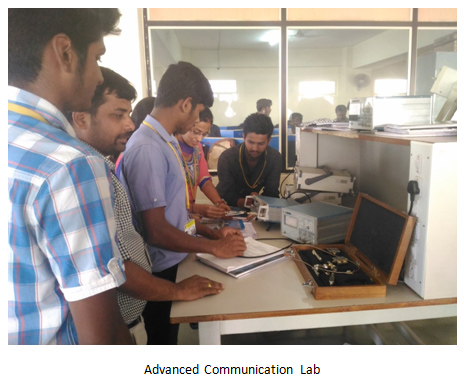Electronics & Communication Engineering
About the Department

The Department of Electronics and Communication Engineering started in the year 2000 and has been in the forefront of imparting quality education to the students. The department has a strong undergraduate program with an intake of 120 students. At the postgraduate level, offers M Tech in VLSI and Embedded Systems. At present, 15 faculties of the department have registered for PhD program; 17 research scholars were awarded PhD from the R&D of ECE Department. UG and PG students are encouraged to undertake various research projects in department R&D and are given regular value added courses and soft skill programs to meet the needs of employability. The unwavering commitment towards students along with a pool of experienced and dedicated teaching faculty makes the department distinguished and the most sought after.


Vision
To impart technical education par excellence and prepare leaders to serve the industries and society.
Mission
M1. : To Provide the world with a highly committed and quality conscious engineering workforce.
M2. : To Encourage the students to built self-help, Power of initiative, courage to change and create new things.
M3. : To inculcate the spirit of cooperation and capacity for organization with special emphasis on their self-reliance and sustainability to meet ever changing requirements of local and global industries
Program Outcomes (POs)
- Engineering knowledge: Apply the knowledge of mathematics, science, engineering fundamentals, and an engineering specialization to the solution of complex engineering problems.
- Problem analysis: Identify, formulate, review research literature, and analyze complex engineering problems reaching substantiated conclusions using first principles of mathematics, natural sciences, and engineering sciences.
- Design/development of solutions: Design solutions for complex engineering problems and design system components or processes that meet the specified needs with appropriate consideration for the public health and safety, and the cultural, societal, and environmental considerations.
- Conduct investigations of complex problems: Use research-based knowledge and research methods including design of experiments, analysis and interpretation of data, and synthesis of the information to provide valid conclusions.
- Modern tool usage: Create, select, and apply appropriate techniques, resources, and modern engineering and IT tools including prediction and modeling to complex engineering activities with an understanding of the limitations.
- The engineer and society: Apply reasoning informed by the contextual knowledge to assess societal, health, safety, legal and cultural issues and the consequent responsibilities relevant to the professional engineering practice.
- Environment and sustainability: Understand the impact of the professional engineering solutions in societal and environmental contexts, and demonstrate the knowledge of, and need for sustainable development.
- Ethics: Apply ethical principles and commit to professional ethics and responsibilities and norms of the engineering practice.
- Individual and team work: Function effectively as an individual, and as a member or leader in diverse teams, and in multidisciplinary settings.
- Communication: Communicate effectively on complex engineering activities with the engineering community and with society at large, such as, being able to comprehend and write effective reports and design documentation, make effective presentations, and give and receive clear instructions.
- Project management and finance: Demonstrate knowledge and understanding of the engineering and management principles and apply these to one’s own work, as a member and leader in a team, to manage projects and in multidisciplinary environments.
- Life-long learning: Recognize the need for, and have the preparation and ability to engage in independent and life-long learning in the broadest context of technological change.
Program Educational Objectives (PEOs)
PEO 1: Graduates apply their knowledge of mathematics and science to identify, analyze and solve problems in the field of Electronics & communication to develop sophisticated communication systems.
PEO 2: Graduates to design and buildup interdisciplinary systems by solving core engineering problems in communication systems which are technically sound, economically feasible and socially acceptable.
PEO 3: Graduates exhibit desire for life-long learning which directs them to obtain thorough knowledge in their chosen fields and motivate them for higher studies/research
Program Specific Outcomes (PSOs)
PSO 1: An ability to understand the basic core courses of Electronics & Communication Engineering and to relate them to various areas of application like Communication Systems, control system, Signal processing, VLSI and Embedded systems.
PSO 2: Should have capability to apply modern tools to analyze and solve complex designs with optimal solutions for various real-world applications.
PSO 3: Excellent adaptability to changing work environment with good leadership qualities and zeal for social and environmental well-being.